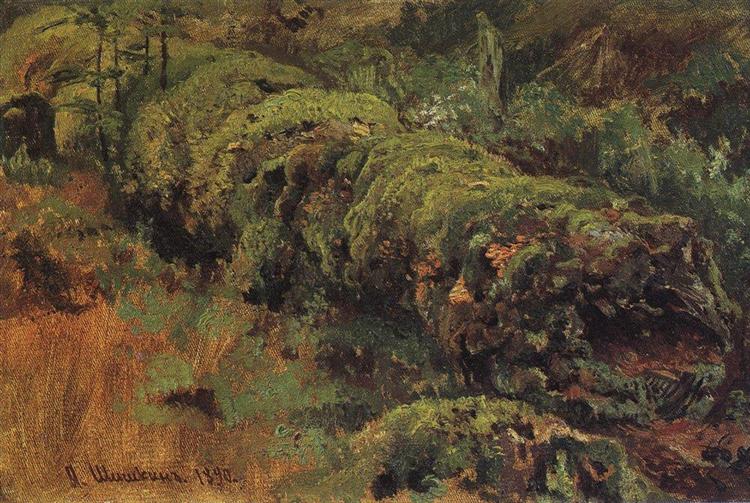On Moss, Rock, Lichen, and Survival


Lately, I’ve been looking at the life cycle of moss. I found myself instantly lost in a thicket of botanical terminology—from the blunt, one-syllable, like clade, to the marvelously complex, like perichaetia, nematodontous, chemoheterotrophic. The words are alien, and for a mind long distant from any formal study of biology, the concepts are, too: the dissemination of spores on the wind to be received by other strange organs, and the spreading, season by season, on inhospitable soil, on rock, on rotting wood, in the arctic and the forest and by the salt sea.
Even more mysterious are lichens. A hybrid organism of alga, bacteria, and fungi, those that are named are named gloriously: Methuselah’s beard, hammered-shield, firedot, crabseye. They grow in the deep desert, they grow over statues like cloaks, they lie over rock faces like accretions of rust. They grow in the ice. They split and grow and abide on such little nourishment as can be afforded by less than the glint of light from an eye.

I indulge myself in these fanciful and half-understood terms because now is a good time to know how to grow, even unnourished; how to flourish, in inhospitable places; how to become a hammered shield, and turn to dust, and grow from it. It is a bitter season to think about how to grow when the ground is stony and cold and leached of good.
It’s the deepest winter I can remember, and I’m not talking about a few light dustings of snow, which are welcome. It’s the completion, yesterday, of the slow-rolling coup that began four years ago, and which was never sufficiently addressed, just left to swell to its ugly completion. In these weeks away from my work I have considered abandoning writing about this polity. After two books and so much staring into dark places, of extending the soredia of my understanding deep into minds where darkness wells and cruelty seeps and justification is vivid and complete—it’s hard not to contemplate laying down that burden. Considering the previous decade and more of my life futile, and walking away. But you can’t walk away from where you’ve grown, and the substrate that sustained you. Such a severing at the root would be fatal.
The Sword and the Sandwich is a newsletter about serious extremism and equally serious sandwiches. Please consider supporting this work with a paid subscription:
There are less than two weeks before this new administration settles in, clinging less like the unassuming lichen, or the soft moss, than something uniquely human: its mix of graft and prurience and greed, zealotry and loathing and boundless hunger, comes from us and only from us. Around it billionaires cluster, ready to trade servility for wealth, and use the servility of others to pad their swollen portfolios. The scabby remnants of a wounded free press are already bending—some despite principle, and others with a thirst to be the mouthpieces of power. The throngs of those who idolize power for its own sake, or whose particular species of zealotry matches its goals, stand ready to mass at its call. Outside this ugly concatenation: the hard ground, the cold ground, the dire places and the deserts.

There is a genus of moss called buxbaumia that grows on the banks of the Volga, and in other subarctic locations. With its white, root-like rhizoids it feeds on things decayed or dead, things deemed worthless or unnecessary, and it makes a blue-black felt mat when it accumulates. It is called bug-moss or elfcap. It grows on rock, and replicates when raindrops displace its spores. It grows up after floods or fires or fissures in the earth. Stemless, leafless, little regarded, it thrives.
I think, as we move into this grim season, we must think like this, survive like this, grow like this: like the hardy and unregarded things that make do with little and less. The things that cultivate the wasteland, and make it soft and green for those who need it; that bloom like rust on rock, that, from air and light and meager rain and ice, make life. Expecting little, noticed less, but irrepressible.
If this is the season of survival, the bitter time when all resources are sucked in by boundless greed, let us make much of the scant nutriment of little hope. Let us make of ourselves a thatched mat under the bracken, up on the clifftops, buried in the cold: of all colors, and very hard to kill. And out of that quiet scrabble, the silent grasp at scraps of light, the silent slip of the white fibrous rhizoid into the dead wood, comes so much: comes glory.

-
Beautiful, thank you
-
Once again I am in awe of your writing. Thank you for this.
-
Perfect, thank you for the words I needed to read.
-
Fine words & reminders.
I'm lichen it
-
Subscribed.
Thank you.
-
Gorgeous to the core.
-
I so very much value sensible, intelligent, good people. I'll have to thank my sister for setting me on to this. Much appreciated. Keep up the good work.
Add a comment: